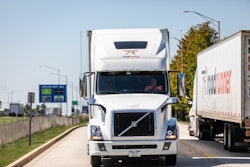In today’s global economy and market connectivity, the trucking and transportation fleet industries are essential to the movement of goods across the country and throughout each community. Successful organizations with transportation fleets understand that their impact goes well beyond the highways and byways they travel. This understanding also extends beyond supply chains and operational bottom lines. A shared sense of responsibility, safety, and economic growth are all impacted by the relationship between transportation fleet companies, their vast network of industry partners, and the communities in which they operate.
Because of this, it is now critically important for these organizations to develop and maintain strong ties with local communities for long-term success.
Transportation is no longer singularly focused on economies
The economic vitality of the regions that transportation fleets and their partners serve is greatly influenced by them. Today’s industry is about more than simply moving cargo. Through fuel purchases, maintenance services, and ancillary businesses, fleets function as collaborators in the advancement of society by creating employment opportunities for locals and boosting economic activity. These businesses foster a vibrant local economy that benefits all parties involved by collaborating closely with the communities in which they do business.
Because they travel so far, fleets get to know the state of the infrastructure in the communities they serve. By actively interacting with communities, they can function as crucial informational resources for local authorities, identifying road hazards, traffic jams, and trouble spots. By reducing accidents and promoting a safer transportation system, such cooperation improves road safety for both truck drivers and the general public.
Safety is about more than just protecting drivers
However, safety is not just about keeping roads, truck drivers, and other motorists safe. Truck drivers have now taken on an additional role as community protectors in the areas they serve. Human trafficking is a global problem, and the trucking industry is increasing its role in trying to address the issue throughout communities. Programs such as the Kids Around The Corner Foundation (KATC) have worked with organizations including Truckers Against Trafficking, a nonprofit organization that has operated since 2009 to educate, equip, empower and mobilize members of the industry to combat human trafficking by partnering with trucking professionals to assist law enforcement not only in the recognition and reporting of human trafficking, but also aid in the recovery of victims and the arrest of their perpetrators. The organization also partners with industry shippers and manufacturers to engage their carriers, raise awareness about human trafficking and use their influence to expand its own research.
A growing focus on family health
Truck drivers work long hours away from their families and homes and are the unsung heroes of the road. The difficulties these drivers encounter can be lessened by forging strong ties with the neighborhood communities. The availability of amenities, rest areas, and support services can greatly enhance their well-being. Communities that help enhance the lives of these drivers while also fostering a more unified and compassionate society.
Many organizations and their industry partners today make it a point to show appreciation for the truckers and families that continuously make sacrifices for the benefit of moving goods across the country. As an example, this is reinforced by the annual IFDA National Championship, an event that celebrates and rewards drivers who embrace a culture of safety and continuously show expertise in their profession as well as the event’s annual Kids Essay Contest, where children of truck drivers are given a chance to share with the community why they are proud of their truck-driving parent, in an essay contest.
Local communities are also benefiting more in new and unique ways. Charitable donations have recently been compiled to provide disaster relief aid for families affected by natural disasters, such as Hurricane Ian in 2022. The industry has also placed a large focus on helping children in need as well, such as the donation of a new John Deere tractor to Horseplay Therapy, an organization which uses horses to provide various therapies to children and veterans with post-traumatic stress disorder, and others. Additional child-related causes include annual back-to-school backpack and school supply drives that benefit distressed children’s groups, where their mission is in preventing child abuse, preserving families, and treating children who have been abused and neglected. Other localized efforts have spanned everything from soup kitchen volunteerism during the holidays to assisting military veteran and wounded warrior projects.
Supporting communities on a global scale
On a more global scale, transportation fleets and industry partners alike have teamed together to help benefit the crisis in Ukraine. European Union (EU) countries bordering Ukraine have allowed entry to all Ukrainian refugees, and the EU has invoked the Temporary Protection Directive which grants Ukrainians the right to stay, work, and study in any European Union member state for an initial period of one year. Some non-European and Romani people have reported ethnic discrimination at the border.
As a way to contribute aid, a group of carriers and logistics companies organized by GP Transco banded together to raise money to support the citizens of Ukraine who remain in the country during the military invasion by Russia. Dubbed Trucking & Logistics Professionals for Ukraine (TLPU), these companies contributed funds toward Save The Children in humanitarian aid to support in the efforts.
Actively participating in communities tends to earn organizations a good reputation that spreads far beyond the confines of their business. Such involvement demonstrates their dedication to the communities they serve, building goodwill and trust with clients, partners, and regulatory bodies alike. An organization's success can be further aided by a skilled workforce, which can be fostered by maintaining a positive public image, which helps in the recruitment and retention of skilled workers.
Organizations with transportation fleets, trucking companies, their industry partners, and local communities have a symbiotic relationship in which all parties benefit from cooperation and support of one another. These businesses can accelerate economic growth, championing sustainability, enhancing safety, and fostering social cohesion in addition to the straightforward act of moving goods. These organizations are establishing enduring relationships that lead to a better, more prosperous future for all parties involved by realizing the importance of their role beyond the wheels. As the journey progresses, it becomes clear that when communities and companies collaborate, everyone's path to success is safer, smoother, and more rewarding.











